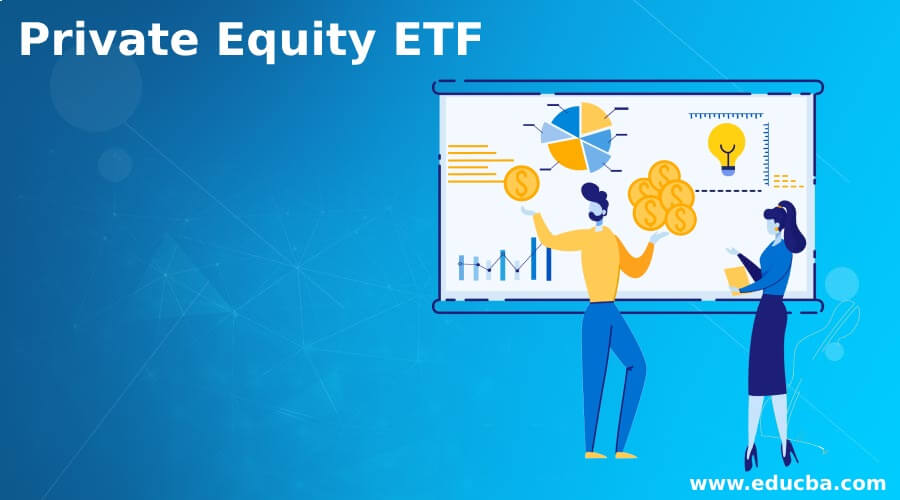Updated July 15, 2023
What is Private Equity ETF?
Private equity refers to the investments made by big time investors like high net worth individuals, institutional investors, or private equity firms in a privately held company. To offer investment opportunities to the smaller investors, the private equity firms then issue relatively smaller units of shares, known as “private equity ETF”.
Although the company where the investment is made does not trade on the exchange, the ETFs can trade on the stock exchange, hence the name.
Explanation
Now, let us look at the working of private equity ETF in more detail.
- Generally, private equity investment is made with a long term horizon, which results in illiquidity in the near term. Most small investors avoid such illiquid funds. So, private equity ETF attracts
small investors as it solves the liquidity issue by introducing the option of exchange trading that makes buying and selling fairly easy. - The quantum of investment required to acquire ownership in a privately held company is usually quite huge, as these investee companies are often in the growth phase. However, the limitation of huge investment mitigates by issuing smaller units to pull in smaller investors.
- Typically, the investee companies don’t possess a strong and professional management team like that of a listed company. In such a scenario, these companies seek help from investment management firms to run the business smoothly, and this is where the private equity firms come into play. In most cases, these private equity firms are listed on the stock exchange and can raise money on behalf of the investee companies.
- Basically, private equity firms invest a large amount of money in these companies and then subdivide their ownership into relatively smaller units of shares, which eventually become ETFs. Consequently, smaller investors can participate and acquire exposure to the private equity domain.
- Since these ETFs can easily trade on the exchange, it offers greater transparency in the private equity domain for smaller investors. Otherwise, transparency is an issue in the private equity domain, given the nature of the investee companies (privately held).
Features of Private Equity ETF
Some of the features of private equity ETF are as follows:
- These types of funds make investments in highly leveraged and strongly transaction-oriented companies.
- The investee companies exhibit the significant potential to grow through expansion or operational improvement; they require capital from private equity.
- These funds cater to the smaller investors seeking to participate in the private equity domain.
- The private equity firms don’t just provide finances. They also extend their financial expertise to run the business smoothly.
- North America has the majority (56%) of the private equity assets available across the globe, followed by Europe (29%) and Asia (11%).
Examples of Private Equity ETF
Now, let us look at some of the top private equity ETFs available across the globe:
- Invesco Global Listed Private Equity ETF: This private equity fund lists on NYSE Arca (ticker: PSP) and is one of the largest private equity ETFs with assets of around $157 million as of Sep 02, 2020. The fund has the highest allocation in the financial sector (64.0%), and geographically it has a major interest in the US (42.7%). It offers global exposure for investors as it has diversified investments in 8 different sectors across 10 countries, having access to 79 publicly listed private equity companies and funds. The benchmark index for this fund is the Red Rocks Global Listed Private Equity Index. The fund’s net expense ratio is 1.78%, generating an ROE of 4.83%.
- ProShares Global Listed Private Equity ETF: This private equity fund is listed on the Cboe BZX trading platform (ticker: PEX) and has net assets of around $16 million as of June 30, 2020. The fund is invested in 30 listed private equity companies with major investments in the financial sector with a sectoral weightage of 91.6%. The benchmark index for the fund is the LPX Direct Listed Private Equity Index. The fund’s net expense ratio is 3.13%, generating a dividend yield of 6.53%.
Benefits of Private Equity ETF
Some of the major benefits are as follows:
- Given that private equity firms have deep pockets, the companies availing the private equity route find access to abundant financial resources. Such funding helps the investee companies to grow through product launches, expansion, or diversification.
- The private equity firms leverage their network of industry experts to add more value to the companies they invest in. They help in the improvement of the existing operations to achieve ambitious goals.
- The smaller investors can gain exposure in the large private help companies through private equity funds.
- Private equity ETFs offer investors greater transparency, which is otherwise impossible in private equity.
Conclusion
So, it can be seen that a private equity ETF is a financial instrument that allows relatively smaller investors to have exposure to privately held companies. Basically, a larger pool of investors attracts to this type of fund, given that the investment size per unit is relatively smaller than the overall investment of the private equity firm, and the units can easily trade on the stock exchange.
Recommended Articles
This is a guide to Private Equity ETF. We also discuss the introduction, examples of private equity ETFs, and benefits and features. You may also have a look at the following articles to learn more –


